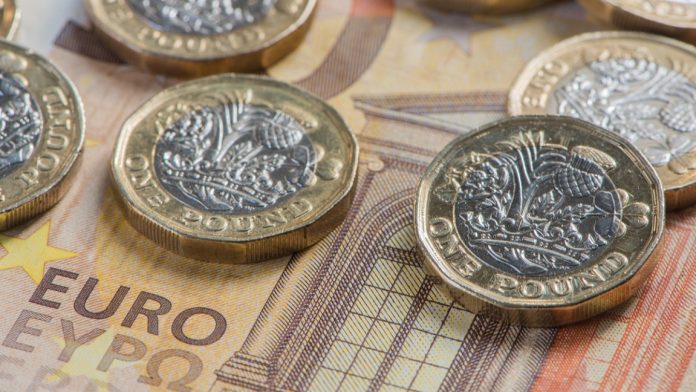Frustrations over Brexit sent the pound falling again on Wednesday, whilst ECB President Mario Draghi and German data lifted the euro. The pound euro exchange rate dropped to a low €1.1595, its lowest level since the end of April.
| What do these figures mean? |
|---|
| When measuring the value of a pair of currencies, one set equals 1 unit and the other shows the current equivalent. As the market moves, the amount will vary from minute to minute. If the euro amount increases in this pairing, it’s positive for the pound. Or, if you were looking at it the other way around:1 EUR = 0.87271 GBPIn this example, €1 is equivalent to approximately £0.87. This measures the euro’s worth versus the British pound. If the sterling number gets larger, it’s good news for the euro. |
After last weeks’ optimism over Brexit, sterling fell for the third straight session on Wednesday. Hopes have quickly faded that cross party talks between the government and the Labour party will break the Brexit impasse in Westminster.
The calls for Theresa May to resign are growing louder by the day. Particularly as the UK looks set to take part in the European elections on 22nd May. This will be a event that could divide the UK Conservative party further. The elections will serve to highlight Prime Minister Theresa May’s failure to deliver Brexit, something the hard-line Brexiteers in the party are finding difficult to deal with.
In an attempt to calm those attempting to oust her, Theresa May has said that she will try to push the Brexit deal through Parliament in two weeks, in a desperate bid to avoid the toxic EU elections. However, with no accord with the Labour party in sight, the chances of the deal making it through the House of Commons is slight. Anther fail could send the pound lower.
| Why is a “soft” Brexit better for sterling than a “hard” Brexit? |
|---|
| A soft Brexit implies anything less than UK’s complete withdrawal from the EU. For example, it could mean the UK retains some form of membership to the European Union single market in exchange for some free movement of people, i.e. immigration. This is considered more positive than a “hard” Brexit, which is a full severance from the EU. The reason “soft” is considered more pound-friendly is because the economic impact would be lower. If there is less negative impact on the economy, foreign investors will continue to invest in the UK. As investment requires local currency, this increased demand for the pound then boosts its value. |
Today is another very quiet day for UK economic data. Pound traders will remain focused on domestic political developments and Brexit talk headlines.
German Economy Shows Signs of Resilience
The euro was broadly in favour in the previous session after German data provided a ray of light and European Central Bank President Mario Draghi gave an optimistic message.
German industrial production data offered support to the common currency the day after factory orders disappointed. Wednesday’s report showed that German industrial production unexpectedly increased in March by 0.5% compared to the -0.5% decline that analysts had been expecting. The data showed that the sector was more resilient to economic headwinds than perceived.
The better than forecast data could boost the Germany’s first quarter GDP data, which is due to be published next week.
| How does strong jobs data boost the currency? |
|---|
| It works like this, when there is low unemployment and high job creation, the demand for workers increases. As demand for workers goes up, wages for those workers also go up. Which means the workers are now taking home more money to spend on cars, houses or in the shops. As a result, demand for goods and services also increase, pushing the prices of the goods and services higher. That’s also known as inflation. When inflation moves higher, central banks are more likely to raise interest rates, which then pushes the worth of the currency higher. |
The eurozone economic calendar is quiet for the rest of the week. Euro trades will pay close attention to the US — Sino trade dispute. The euro traders inversely to the dollar so should tensions rise again between the US and China as trade talks kick off today, the dollar could rally, weighing on demand for the euro.
This publication is provided for general information purposes only and is not intended to cover every aspect of the topics with which it deals. It is not intended to amount to advice on which you should rely. You must obtain professional or specialist advice before taking, or refraining from, any action on the basis of the content in this publication. The information in this publication does not constitute legal, tax or other professional advice from TransferWise Inc., Currency Live or its affiliates. Prior results do not guarantee a similar outcome. We make no representations, warranties or guarantees, whether express or implied, that the content in the publication is accurate, complete or up to date. Consult our risk warning page for more details.
This article was initially published on TransferWise.com from the same author. The content at Currency Live is the sole opinion of the authors and in no way reflects the views of TransferWise Inc.





